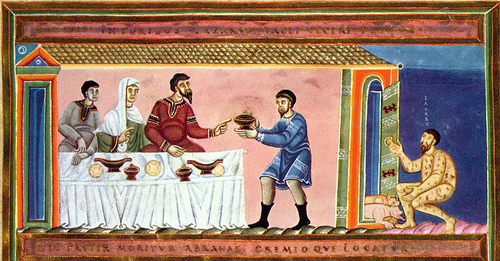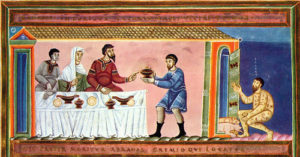Rich Man and Lazarus
Devotions on Luke 16:19-31
Fourth Sunday in Lent
Monday, Rich Man and Lazarus
“There was a rich man who was dressed in purple and fine linen and who feasted sumptuously everyday” (Luke 16:19).
The headlines screamed, “Twenty-four million predicted to lose their health care coverage.” Tom put down the paper, shook his head and said to himself, “I’m sure glad I have medical insurance through my employer. It doesn’t cost me a dime.” On his way to work Tom was forced to take a detour because of a “Black Lives Matter,” demonstration. “You know, he announced to his car pool buddies, “If they would just stay out of trouble, they wouldn’t have a problem.” Driving home after a tough day at the office, Tom saw a woman at a busy intersection. She held up a sign, “Veteran, Two children, Homeless, Please help.” Tom looked away and muttered, “Why doesn’t she just get a job.”
It’s a vicious circle. Selfishness and self-centeredness build affluence. At the same time, affluence reinforces selfishness and self-centeredness. The desire to build up our comfort, security and possessions increases, while our motivation to help others decreases. The rich man only wanted to enjoy all that life had to offer—just like us. As followers of Jesus, however, this is not the path on which God calls us to walk. Our affluence hinders our ability to experience a truly abundant life.
We offer our craving for more to you, Lord, and ask that you might change it into a desire to help others have enough. Amen.
Tuesday, Rich Man and Lazarus
“At his gate lay a poor man named Lazarus” (Luke 16:20).
Connie Lopez worked for a large law firm compiling information for legal briefs. It was a non-glamorous, behind the scenes job, but Connie enjoyed her work. At a company picnic, Connie was obliged to go through a receiving line and shake hands with several of the firm’s partners. Introducing herself to one of the partners, he responded, “Oh, I know you, Consuela. You’ve done some great work on a couple of briefs I presented.” Connie didn’t remember much about the rest of the picnic. She was relishing the knowledge that a partner knew her name and appreciated her work.
Identifying a person by name is significant. Usually, we remember the names of “important” people and forget the names of others. Because of this, it is interesting that Luke identifies the poor man by name, but not the rich man. Luke wanted to emphasize that the poor and suffering are important in God’s eyes. God’s priorities are quite different from those of modern society.
As followers of Jesus, we can rejoice that God knows the names of the greats and the not-so-greats—and God knows our names. We are not strangers to God and God is intimately involved in our lives.
As we seek to shine brightly for you, Lord, enable us to acknowledge the importance of the people around us and their work in our lives. Help us to pray for them by name. Amen.
Wednesday, Rich Man and Lazarus
“Who longed to satisfy his hunger with what fell from the rich man’s table” (Luke 16:21a).
At the end of the day, employees of a fast food restaurant would empty the leftover food into a dumpster. The restaurant manager noticed that, shortly after that took place, a few homeless people would scrounge through the dumpster. That night the manager spoke to the homeless and rather than have them eat from the dumpster, he offered to buy them meals. From that time on, employees saved much of the food that normally would have been thrown away and gave it to the homeless every night. It didn’t cost the restaurant anything, but the generous action touched the lives of scores of people.
Lazarus didn’t want the linen clothing or even the sumptuous meals. He wanted scraps—left overs. Ministering to the needs of others often doesn’t begin with sacrifice, but rather with sharing. God is a God of abundance. When we begin to share, we discover that we have more than enough for ourselves. Plus we have the joy of using our blessings so that they become blessings to others.
God of Abundance, teach us to share. Amen.
Thursday, Rich Man and Lazarus
“Even the dogs would come and lick his sores” (Luke 16:21b).
What an indictment! The dogs acted in a more humane manner than the rich man. We can learn a lot by observing members of the animal kingdom. One important lesson that we can learn is that we need one another. Most animals live in packs, herds and flocks. Those who try to go it alone usually don’t last very long. The rich man realized this too late.
God has blessed us with people to be a part of our lives. It is often through other people that we experience God’s presence, strength, care, encouragement and peace. Being a part of the group, challenges us to be a part of other peoples’ lives, too. Together we can care for each other and support each other. We can together combine our gifts and talents to share God’s love and grace and proclaim the good news of Jesus. God has blessed us richly!
Lord, thank you for the people who are a part of our lives and who make our lives both possible and enjoyable. Amen.
Friday, Rich Man and Lazarus
“The poor man died and was carried away by the angels to be with Abraham. The rich man also died …. In Hades, where he was being tormented” (Luke 16:22-23).
The people who first heard this story would have been shocked. To think that the rich were destined for hell and the poor for heaven was beyond imagination. Everyone thought that riches were a sign of God’s blessings because of a righteous life. Conversely, poverty was a sign of God’s judgment because of some great sin.
There are times when we play the little, judgmental Christian game called, “Who’s in and Who’s Out.” We spend our time deciding who has the right lifestyle, correct theology and significant righteous works to allow him or her to enjoy the prospect of heaven. Usually those who aren’t like us or who don’t agree with our religious or political points of view don’t make it.
As followers of Jesus we can rejoice that we don’t need to be concerned about our salvation, or anyone else’s for that matter. We can celebrate that because of Jesus’ life, death and resurrection all of that has been taken care of. Instead of issuing statements of judgment, we can boldly and lovingly proclaim that we are all God’s children whom God has gathered into God’s family. Together we can celebrate our salvation and our unity.
Lord, forgive us when we are so quick to judge others. Move within us so that we may be quick to love and slow to judge. Amen.
Saturday, Rich Man and Lazarus
“Send Lazarus to dip the tip of his finger in water and cool my tongue” (Luke 16:24).
Except for times of private prayer, there is no record in the gospels of Jesus ever doing anything for himself. His actions are the epitome of putting others first. Healing the sick, casting out demons, touching lepers, eating and drinking with sinners are examples of love and acceptance which, as followers of Jesus, we are called to follow.
The path of love and acceptance, and placing others before ourselves is not an easy one, though. Selfishness and self-centeredness dies hard. We can see that in this story of the rich man. Even in hell, he wanted God to order Lazarus to ease the rich man’s thirst. The rich man still saw himself as the lord and Lazarus as the servant. He couldn’t get his mind around the idea of equality much less role reversal.
Though difficult, placing others above ourselves is not a chore. Lives of generosity, sharing and service are filled with joy and blessed with relationships. Serving others gives us a sense of purpose and opens us up to experience abundant lives that are ours through the work of Jesus.
May our feet walk your paths, Lord, our hands do your work and our mouths share your good news. Amen.
Sunday, Rich Man and Lazarus
“If they do not listen to Moses … neither will they be convinced even if someone rises from the dead” (Luke 16:31).
We’re always looking for God to prove that God exists. “End the war,” we say, “and then we will believe.” Others might say, “End the suffering,” or “Cure my cancer,” and then we believe. Such proof usually doesn’t work, though. If something does happen, we tend to explain it away. Jesus foresaw this fact in this story. When asked by the rich man to send Lazarus back to the man’s brothers, God refused, saying that even if someone rose from the dead they wouldn’t believe. When Jesus was raised from the dead, people reasoned it away—“Someone stole the body,” they said, “Or, Jesus on fainted and was revived in the tomb. Jesus really didn’t rise from the dead.”
The Moses, to which the story refers, is the Torah. The Torah is more than a set of laws. It is the collection of stories of God interacting with humankind—a proclamation of love and grace and a demonstration of faith. It’s the everyday life of God’s children and not the flashy supernatural happenings that breeds faith in the lives of others. Love that stands by others in struggles and tragedies, rejoices with others in times of celebration and speaks well of others in the face of criticisms is what bears witness to the fact that Jesus lives and that God is moving powerfully in our world.
The Holy Spirit has chosen to use our words and deeds rather than angelic visions to breathe life into the lives of those around us. What a humble privilege it is to be used by God in such a manner.
Jesus, you live! Empower us to share this good news with everyone around us by our words and our actions. Amen.


